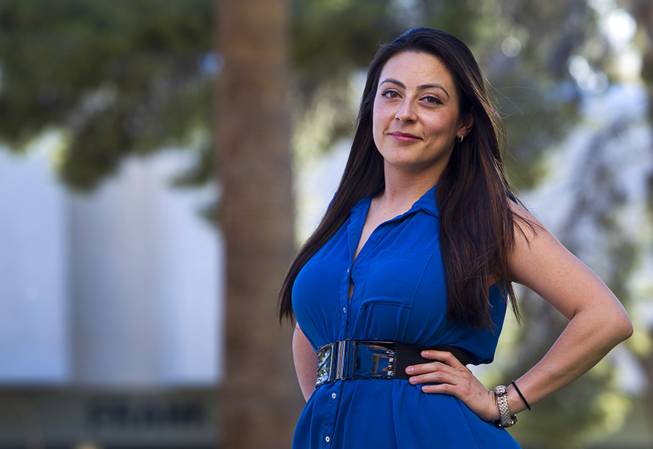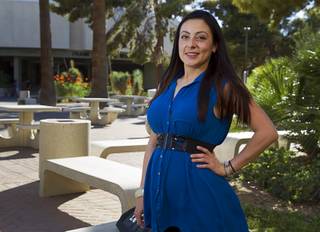
UNLV student Greysel Sousa poses outside the UNLV student union Wednesday, July 23, 2014. Sousa, a recipient of President Obama’s Deferred Action for Childhood Arrivals program (DACA), has started the Coalition for Advancement of Undocumented Student Education (CAUSE) to help other immigrant students, specifically undocumented students and those with DACA work permits.
Friday, July 25, 2014 | 2 a.m.
A year ago, Greysel Sousa wouldn’t have made her recent trip to explore the international relations doctorate programs of several East Coast colleges, including Johns Hopkins, Tufts and Princeton.
Such a trip would have been too risky. Sousa, 28, was leading dual lives back then, working and going to school while sharing with only those closest to her that she was illegally living in the country.
“I cried when Deferred Action (for childhood arrivals) was announced,” she said. “It feels like you are out of jail. You can actually talk to people about your experiences, your life and who you are.”
Before she was granted a work permit and Social Security number through the Deferred Action for Childhood Arrivals (DACA) program, Sousa was in a self-imposed social straitjacket. She feared going to bars and clubs with friends only to be ridiculed and turned away for her lack of identification.
So, when she finally got her papers through DACA, she was emboldened and determined to effect change for others like her.
After attending some diversity meetings and talking to UNLV staffers, Sousa got the idea to start Nevada’s first student organization dedicated to helping undocumented students. In fall 2013, Sousa and a group of other UNLV students founded the Coalition for the Advancement of Undocumented Student Education, CAUSE.
Born in Mexico City, Sousa lived with her father in Mexico during much of her childhood after her parents separated. When Sousa was 13, her father — a successful architect — arranged for a smuggler to escort her to the U.S. after Sousa made a failed attempt to obtain a visa. At the time, Sousa’s father was suffering from chronic health problems.
Two years later her father died, and Sousa grasped the ramifications of her lack of legal status when she realized she couldn’t return from Mexico if she went back for his funeral.
Sousa also struggled to adapt in the U.S., learning quickly what it is like to be an outsider and lack the social connections that make life easier.
“I didn’t know English, but I learned fast,” she said. “I didn’t fit in with the Chicano kids, being from Mexico City … it’s just different culturally. I was ostracized by the American kids, and I was ostracized by the Latinos. I didn’t fit in.”
Sousa started off living with her mother, who had moved to the U.S. illegally, and going to Chaparral High School. Eventually she transferred to the advanced College of Southern Nevada High School program. She got her first job when she was 15, and she saved $350 to purchase a fake green card and Social Security card. She has worked ever since, legally for the first time last year.
“I worked at Jack in the Box for a while, and I was working with engineers from Ecuador who came undocumented because of the lack of opportunities there,” she said. “And when they came to the university, they were told to redo their entire education again. So I’m flipping burgers with engineers and accountants, and they’re all undocumented.”
Sousa got her high school diploma, then an associate's degree in political science from CSN before moving on to UNLV, where she is on track to graduate in December with a degree in political science and international relations.
Sousa was one of about 10,000 people in Nevada who have been approved for DACA, according to the latest U.S. Citizenship and Immigration Services numbers. The Migration Policy Institute estimates that roughly 23,000 immigrants in Nevada qualify.
The two-year program, which President Barack Obama recently announced would be renewed, has been controversial. The House has voted multiple times to terminate DACA, which has been attacked by several GOP legislators as a form of amnesty.
Jose Melendrez, UNLV’s assistant vice president in the office of diversity initiatives, says even though DACA is temporary and could end with the next administration, it has helped students access resources and pay the bills to continue their education.
Melendrez has seen several undocumented students struggle navigating the university system, and he applauds Sousa’s efforts.
“Greysel is a very dynamic young leader,” Melendrez said. “A lot of undocumented students lose hope and have trouble seeing a future for themselves. Having a group like CAUSE on campus shows these students they have a community they can reach out to, and that can be crucial in not just getting kids to enroll in UNLV but also getting them to graduation.”
Sousa says she understands the position of some of the conservative legislators, but that is no reason to let talent go to waste.
“I understand the conservative mindset that you should process everything first and try and come the right way. But it wasn’t up to me; it was up to my parents,” she said. “All we’re trying to do is provide education for people. This is going to benefit the community overall. The higher the graduation rate, the better your city will do.”
Now armed with a work permit, Sousa is free to travel the country and explore her options. She still is not eligible for federal aid, but with a Social Security number she can fill out the paperwork necessary for many private grants and scholarships.
She is a self-described risk taker but knows from experience while living in the country illegally how suffocating it can be.
“Now that I have been more vocal, students from campus come up to me to share their stories,” Sousa said. “Many of them are still horribly paranoid and scared. I’m trying to help them realize the opportunities that are available to them. A lot of them now are changing their goals. Instead of saying, ‘I’m going to get my bachelor's,’ they are saying, ‘I’m going to be a lawyer.’”


Join the Discussion:
Check this out for a full explanation of our conversion to the LiveFyre commenting system and instructions on how to sign up for an account.
Full comments policy